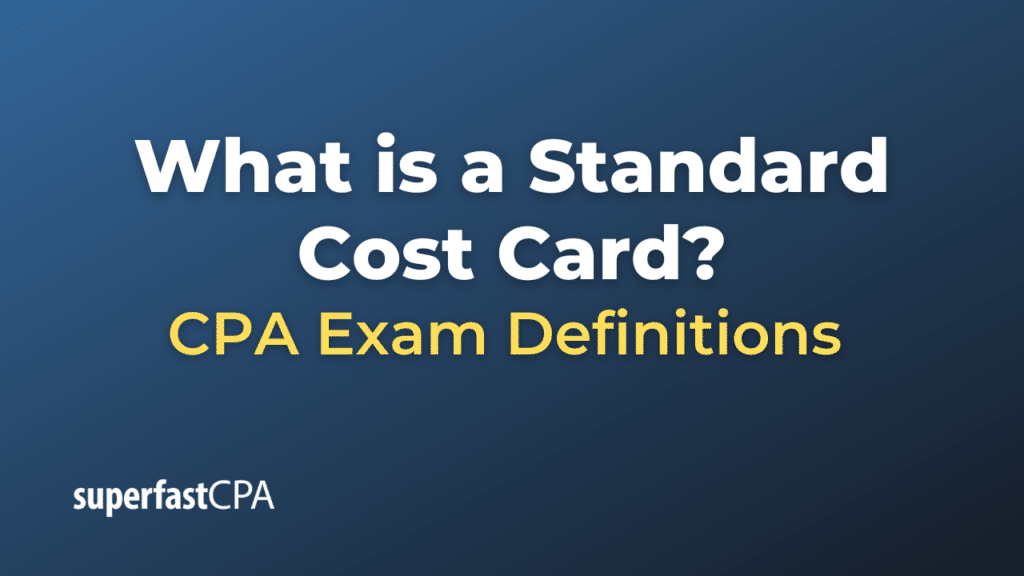Standard Cost Card
A Standard Cost Card is a detailed record or document that provides a breakdown of the standard costs associated with producing a particular product or carrying out a specific job. It’s a tool used primarily in managerial accounting and cost accounting to set cost benchmarks, facilitate budgeting, and analyze variances.
A Standard Cost Card typically includes:
- Description of the Product or Job: This provides clarity on what the card relates to, whether it’s a specific product, component, or job.
- Direct Materials:
- Quantity: The standard quantity of each material required to produce one unit.
- Cost: The standard cost of each type of material per unit.
- Total Cost: The standard total cost of the materials (quantity multiplied by the cost per unit).
- Direct Labor:
- Time: The standard number of labor hours required to produce one unit.
- Rate: The standard wage rate per hour.
- Total Cost: The standard total labor cost (time multiplied by the rate).
- Manufacturing Overhead:
- Allocation Basis: The basis used to allocate overhead costs, such as machine hours or labor hours.
- Rate: The standard overhead rate (could be per machine hour, per labor hour, etc.).
- Total Cost: The standard overhead cost, calculated using the allocation basis and rate.
- Total Standard Cost: The sum of the standard costs of direct materials, direct labor, and manufacturing overhead. It represents the total cost to produce one unit of the product or to perform the job based on standard rates and efficiency.
Example of a Standard Cost Card
Let’s dive into a fictional example using a company that produces eco-friendly water bottles:
Company: GreenBottle Inc.
Product: 500ml Eco-Friendly Water Bottle
Standard Cost Card: 500ml Eco-Friendly Water Bottle
1. Direct Materials:
- Bottle Body (Recycled Plastic):
- Quantity: 100 grams
- Cost per gram: $0.01
- Total Cost: $1.00
- Bottle Cap (Biodegradable Material):
- Quantity: 10 grams
- Cost per gram: $0.02
- Total Cost: $0.20
- Label (Recycled Paper):
- Quantity: 1 label
- Cost per label: $0.05
- Total Cost: $0.05
Total Material Cost: $1.25
2. Direct Labor:
- Assembly and Quality Check:
- Time: 0.10 hours (6 minutes)
- Rate: $15/hour
- Total Labor Cost: $1.50
3. Manufacturing Overhead:
- Allocation Basis: Direct Labor Hours
- Rate: $10 per direct labor hour
- Total Overhead Cost: $1.00 (0.10 hours x $10)
Total Standard Cost for 500ml Eco-Friendly Water Bottle: $3.75 ($1.25 + $1.50 + $1.00)
Now, let’s say GreenBottle Inc. reviews its production at the end of the month and finds that the actual cost to produce each bottle was $4.00. The management can then compare this actual cost with the standard cost from the Standard Cost Card to determine variances, find out reasons for discrepancies, and take corrective actions if necessary.
This kind of analysis allows companies to identify areas where they might be overspending, areas of inefficiency, or where they might need to adjust their standard costs based on new information or changing circumstances.













